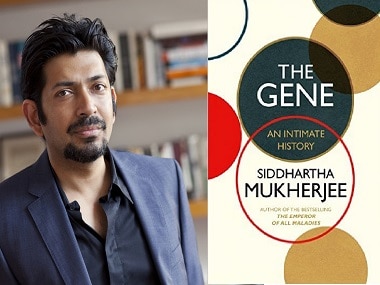What is illness? What is normal? If you had two children, one of whom you found out, carried a gene for schizophrenia, would it change how you viewed your child? Would you treat him/her differently? Would it change the way the child imagined himself or herself? Would you tell your partner if you had a family history of a particular illness? If there was a way to treat the future generation, such that they wouldn’t have to carry a faulty gene, what would you do to afford that treatment? What if we created a class system where the rich could afford such genetic interventions, while the poor could not? What would that mean for adoption? These are just some of the questions noted oncologist and acclaimed writer Siddhartha Mukherjee’s new book, The Gene: An Intimate History, raises. It comes nearly six years after his Pulitzer-winning debut, The Emperor of All Maladies, but Mukherjee says that The Gene, is in a sense, a “prequel”. Mukherjee spoke about his book, and how he came to write it, in a conversation with Rohan Murthy, at The Gene’s launch hosted in Mumbai this week by Penguin Random-House India and Literature Live. [caption id=“attachment_2884428” align=“alignleft” width=“380”]  Siddhartha Mukherjee (L), image by Deborah Fiengold; (R) cover of ‘The Gene: An Intimate History’[/caption] The Gene, Mukherjee said, came about because of three reasons. One was that he felt there were too many unanswered questions – like why humans don’t grow back (lost) limbs – that needed to be addressed. The second was the great advancements in technology and the knowledge it has made possible about the gene – and the ethical implications of these advancements. As Mukherjee said, “The fantasy to eliminate suffering is so great… you should not trust anyone, including me. (These ethical dilemmas) cannot be sorted in a medical boardroom, they have to be discussed by people everywhere.” The Gene has certainly initiated those debates among readers. But it is in the sub-title of the book “An Intimate History” that Mukherjee’s third compelling reason to write The Gene, emerged. It is in a sense, to lay the ghost of mental illnesses in his own family to rest, that Mukherjee wrote this book. Close members of his family suffered from schizophrenia and bipolar personality disorder. The book has moving sections of intense suffering that Mukherjee experienced first-hand in members of his family, which he has beautifully woven together with the science behind the gene, in his book. Rohan Murthy asked Mukherjee about a scene he describes in the book, where he (Mukherjee) writes of telling his then girlfriend (now wife) Sarah Sze of his family history of mental illness. Mukherjee said he called that conversation his moment of “full disclosure” – and that not telling Sarah was not an option he ever considered. At the same time, Mukherjee said, he has never had his genome sequenced (to test for predilections to any of his family’s conditions). “Sequencing to find out schizophrenia or bipolar disorder is (not easy), although, ironically, my lab does the best work in this field! So it wouldn’t be difficult to slip a drop of my blood in (for testing)!” The conflict in adding to our knowledge of the gene – and being tempted to tamper with it, even with the best of intentions – was a subject that Mukherjee touched on repeatedly. “We’re talking about this in a country where the population structure has changed by a million – because of a single chromosome,” Mukherjee said, referring to the practice of female infanticide. “In four states in India, the female to male ratio of the population is around 820:1000. In those states, people decided that having a girl child amounts to some kind of ‘illness’. The effects on society are so dramatic.” The evening ended with Mukherjee being asked if “writing was a heredity gene” and if all that he now knew about genetics had made him believe in a higher (spiritual) power. Mukherjee laughed off the former query, saying, “I don’t know if writing is a genotype. All I know is that it is hard work!” For the latter, he had this response: “Not for me. (If anything, it has made me believe that) evolution is an incredible power. We underestimate evolution, and it is so powerful a creative force. We (humans) are such a young species. The real giants standing on the shoulders of time are bacteria, that figured out how to make us work… how pigment that sensed light could be anatomically organised with a brain… So it makes me believe even more in the power of evolution.” _Read an extract from Siddhartha Mukherjee's The Gene: An Intimate History, on Firstpost._ Watch a lecture by Siddhartha Mukherjee on the ‘gene’ here:
In his new book, The Gene: An Intimate History, Siddhartha Mukherjee has laid the ghosts of his family’s history of mental illness to rest - and raised several pertinent questions for society to consider
Advertisement
End of Article


)
)
)
)
)
)
)
)
)



